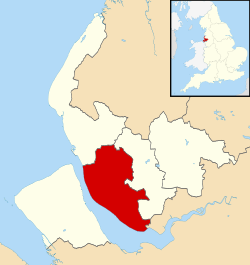Liverpool is a cathedral city, port city, and metropolitan borough in Merseyside, England. It had a population of 496,770 in 2022.[3] The city is located on the eastern side of the Mersey Estuary, adjacent to the Irish Sea, and is approximately 178 miles (286 km) northwest of London. Liverpool is the fifth largest city in the United Kingdom and the largest settlement in Merseyside. It is part of the Liverpool City Region, a combined authority with a population of over 1.5 million.[5]
Established as a borough in Lancashire in 1207, Liverpool became a significant town in the late 17th century, when the port at nearby Chester began to silt up. The Port of Liverpool became heavily involved in the Atlantic slave trade, with the first slave ship departing from the town in 1699. The port also imported much of the cotton required by the neighbouring Lancashire textile mills, and became a major departure point for English and Irish emigrants to North America. Liverpool rose to global economic importance at the forefront of the Industrial Revolution in the 19th century and was home to the first intercity railway, the first non-combustible warehouse system (the Royal Albert Dock), and a pioneering elevated electrical railway; it was granted city status in 1880 and was moved from Lancashire to the newly created county of Merseyside in 1974. Like many other British cities, it entered a period of decline in the mid-20th century; however, it has experienced significant and ongoing regeneration since the European Union selected it as the European Capital of Culture in 2008,[a] which was reported to have generated over £800 million for the local economy within a year.[6][7]
The economy of Liverpool is diversified and encompasses tourism, culture, maritime, hospitality, healthcare, life sciences, advanced manufacturing, creative, and digital sectors.[8][9][10] The city is home to the UK's second highest number of art galleries, national museums, listed buildings, and parks and open spaces, with only London having more.[11] It is often used as a filming location due to its distinctive architecture, and was the fifth most visited UK city by foreign tourists in 2022.[12] It is the only UNESCO City of Music in England and has produced countless musicians, most notably the Beatles, who are widely regarded as the most influential band of all time; musicians from the city have released more UK No. 1 hit singles than anywhere else in the world.[13] It has also produced many academics, actors, artists, comedians, filmmakers, poets, scientists, sportspeople, and writers. In sports, it is known as the home of Premier League football teams Everton FC and Liverpool FC. The world's oldest still-operating mainline train station, Liverpool Lime Street, is in the city centre; transport is also served by the underground Merseyrail network. The city's port was the fourth largest in the UK in 2023, with numerous shipping and freight lines having headquarters and offices there.[14]
Residents of Liverpool are often called "Scousers" in reference to scouse, a local stew made popular by sailors in the city, while "Scouse" is also the most common name given to the distinctive local accent. The city's cultural and ethnic diversity has resulted from its history of attracting immigrants, especially from Ireland, Scandinavia, and Wales; it is also the home of the earliest black community in the UK, the earliest Chinese community in Europe, and the first mosque in England.[15]
- ^ "Council". Liverpool City Council. Archived from the original on 16 December 2023. Retrieved 16 December 2023.
- ^ "Mid-Year Population Estimates, UK, June 2022". Office for National Statistics. 26 March 2024. Retrieved 3 May 2024.
- ^ a b "Mid-Year Population Estimates, UK, June 2022". Office for National Statistics. 26 March 2024. Retrieved 3 May 2024.
- ^ a b UK Census (2021). "2021 Census Area Profile – Liverpool Local Authority (E08000012)". Nomis. Office for National Statistics. Retrieved 8 August 2023.
- ^ Fenton, Trevor (25 April 2023). "Regional gross domestic product: city regions". Office for National Statistics. Archived from the original on 1 September 2023. Retrieved 2 September 2023.
- ^ "Report on the Nominations from the UK and Norway for the European Capital of Culture 2008" (PDF). Archived from the original (PDF) on 19 August 2008. Retrieved 11 July 2008.
- ^ "Liverpool, European Capital of Culture: 2008 – 2018". 6 April 2018. Archived from the original on 27 May 2022.
- ^ "Liverpool to become £80m investment zone". lbndaily.co.uk. 15 March 2023. Archived from the original on 29 August 2023. Retrieved 3 January 2024.
- ^ "Economy of Liverpool". varbes.com. Archived from the original on 29 August 2023. Retrieved 3 January 2024.
- ^ "'Liverpool's economy will thrive' says Prof Parkinson". lbndaily.co.uk. 8 August 2022. Archived from the original on 8 August 2022. Retrieved 3 January 2024.
- ^ Cite error: The named reference
visitliverpoolwas invoked but never defined (see the help page). - ^ "Inbound Tourism Spend & Trends By UK Town | VisitBritain.org". visitbritain.org. Archived from the original on 28 April 2024. Retrieved 14 May 2024.
- ^ "The Beatles' Now and Then success 'a landmark for Liverpool too'". BBC News. 13 November 2023. Archived from the original on 14 May 2024. Retrieved 14 May 2024.
- ^ "UK: leading sea ports for freight traffic 2023". Statista. Archived from the original on 14 May 2024. Retrieved 14 May 2024.
- ^ "Help Restore & Expand England's First Mosque". abdullahquilliam.org. Archived from the original on 18 November 2019. Retrieved 8 October 2023.
Cite error: There are <ref group=lower-alpha> tags or {{efn}} templates on this page, but the references will not show without a {{reflist|group=lower-alpha}} template or {{notelist}} template (see the help page).









